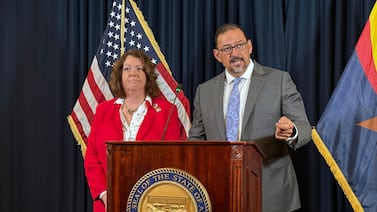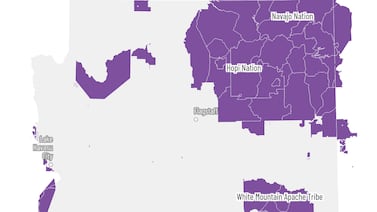Votebeat is a nonprofit news organization reporting on voting access and election administration across the U.S.
A version of this post was originally distributed in Votebeat’s free weekly newsletter. Sign up to get it delivered to your inbox every Saturday.
Happy Fourth of July.
Also, happy summer vacation to everyone at Votebeat — we’re taking next week off to recharge.
In light of the holiday, here’s an homage to historical election practices that were bad ideas — bad ideas officials were often warned about and went ahead with anyway. I will mention three here, but I welcome your submissions, which may be featured in future newsletters.
Let’s talk about lever machines — the hulking, metal behemoths that New York state refused to stop loving until 2010 (not a typo).
Invented by Jacob H. Myers and patented in 1889, they were first used in Rochester, N.Y. — where Mr. Myers lived — in a general election seven years later. In their very first use, they were a disaster, according to an otherwise glowing biography of Myers.
“All did not go well in Rochester at the election of 1896. Some machines, apparently, lost dozens, or perhaps hundreds of votes,” it recounts. A lawsuit followed. So did media fury. And yet! AND YET! People loved these stupid, giant things.
Despite the problems, lever machines were slowly adopted by counties across New York and elsewhere in the country. The machines suffered from the same problems the entire time they were used, more than a century. Despite how impenetrable they appeared, election judges could accidentally (or not) screw up an entire election by sticking a pencil in the back end. Seriously.
Still, they persisted for so long because voters actually preferred them to paper ballots due to their confidence-inspiring size. There’s a joke here, which I’ll let you make on your own.
But please stop talking about online voting. I won’t go on for very long about this, because the risks of online voting are well-established. Even while there’s a perpetual push for online voting, early experiments with it have proven why it’s a tough sell. The very first legally binding election conducted online was the 2000 Democratic primary in Arizona, held by a New York-based company called Votation.com (now election.com). It did not go well! Among the tech woes, Votation’s system blocked many Macintosh users from logging in. Voter access — not fraud — turned out to be the problem.
But I just want to point out that nonetheless, people keep trying to do it.
This entry has mostly been included as an appeal to the owners of election.com, who have yet to respond to my inquiries (and how many inquiries could you possibly get, really!) about the status of their business. Please email me.
(Please do not email me about blockchain, ever, at any time. Thank you.)
We were warned about hanging chads, my friends. Shout out to Roy Saltman, an American hero who we all ignored when he warned us about the danger of hanging chads — the undetached shard of paper in punch card voting — way back in the year 1988! That’s right, folks! 1988!
In a 132-page report that year, Saltman, who was working for the National Institute of Standards and Technology, wrote: “A partially removed chad may be pressed back into the card during the stacking of the cards in preparation for reading, or during the reading itself. If the chad is pressed back, no vote will be recorded for that location, even if it was the intention of the voter to cast that vote.” Can you hear 2000 sneakin’ right up on us?
But like many things, this had to explode in our faces Big Time for us to make changes.
In honor of Saltman, and others who tried to avert election meltdowns and bad practices, email me and tell me about the modern-day Cassandras issuing smart warnings today.
A heads up: As Jessica said, we’re taking time off for the July 4th holiday. We’ll be back in the office on July 10, and the newsletter will return on the 15th.
New From Votebeat
From Votebeat Texas: Texas fixes some obstacles to mail voting that dogged voters after 2021 restrictions
From Votebeat Arizona: As pressure mounts to fix Pinal’s problems, elections director resigns
From Votebeat Arizona: Arizona elections would have fewer rules under Secretary of State Adrian Fontes’ new manual
From Votebeat Pennsylvania: Philadelphia’s communities of color are disproportionately affected when mail ballots are rejected over small errors
From Votebeat Pennsylvania: Al Schmidt gets crucial approval to become next secretary of commonwealth
In Other Voting News
The Supreme Court released a long-awaited blockbuster election law decision in Moore v. Harper Tuesday, ruling 6-3 to reject the most extreme version of the so-called independent state legislature theory and find that state legislatures’ power over federal elections is not absolute, but subject to review by state courts. Chief Justice John Roberts, who wrote in the majority opinion, described such judicial review as “a fundamental principle.”
It largely preserves the status quo, though with some uncertain implications. The majority did find that federal courts can step in to review state courts’ decisions under certain circumstances, writing that “state courts may not transgress the ordinary bounds of judicial review.” That aspect of the decision prompted some election law experts, including Rick Hasen of the University of California, Los Angeles, to warn that it gives federal courts an opening to second-guess rulings by state courts, and could prompt a new rush of election litigation. Constitutional law expert Rick Pildes writes that the Supreme Court offered only vague guidance as to how federal courts should determine state courts have gone too far, leaving legal uncertainty.
Justice Clarence Thomas, writing critically in dissent, said cases “will arise haphazardly, in the midst of quickly evolving, politically charged controversies, and the winners of federal elections may be decided by a federal court’s expedited judgment that a state court exceeded ‘the bounds of ordinary judicial review’ in construing the state constitution.”
Want to read more? The Washington Post got reaction from a broad range of experts and advocates. The Wall Street Journal examines the potential consequences of the decision (and talks to John Eastman, among others).
Jessica Huseman is Votebeat’s editorial director and is based in Dallas. Contact Jessica at jhuseman@votebeat.org.





